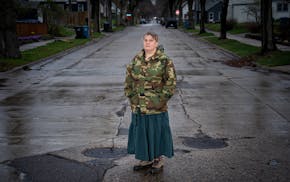After years of frustration with a senior care home embedded in their secluded, wooded neighborhood, Minnetonka residents successfully swayed the city Monday to deny the senior home's request to expand.
It's part of a growing debate that more communities across Minnesota are facing as senior homes pop up in single-family neighborhoods, outnumbering the large apartment-style senior housing facilities. But in Minnetonka, residents of the Fairhills neighborhood said that while they support Gianna Homes, a memory-care home that houses 10 people with Alzheimer's, they're drawing the line at the home's request to add an 11th resident, fed up with years of extra garbage, parked cars and traffic from visitors, emergency responders and delivery trucks.
"There is a great compassion for this," resident Floyd Midura said. But "there are 33 other homes being impacted by this."
More than 70 people packed the City Council meeting on Monday evening, with more than 20 people speaking against or in support of Gianna Homes and whether it fits into the neighborhood. Five members of the seven-member council were present, and all five voted to deny owner Anne Marie Hansen's request to add an 11th resident, which she said wouldn't have increased staff or the physical space but was needed to help offset the costs of adding a $175,000 commercial kitchen to meet state health standards, which the city is requiring she do before July.
She's already expanded twice before since opening 13 years ago, getting city approval to add residents beyond the six state law allows for group homes.
The care model is one that is growing among senior housing, outpacing the number of large apartment-style senior housing in Minnesota. Of 1,721 service providers statewide that house seniors or people with disabilities, nearly 700 have 10 units or less, while only 135 providers serve more than 100 clients in larger buildings, according to Aging Services of Minnesota.
In Hanover, the city is reviewing a request for a similar residential care home, said Hanover City Council Member Chris Kauffman, whose mother also lives at Minnetonka's Gianna Homes.
"We've seen some resistance in our city, as well with the not-in-my-backyard mentality," he said. "The Number 1 issue is, does Gianna fit in your neighborhood? And I must say yes."
In Minnetonka, Monday's discussion pitted families like Kauffman's with loved ones in Gianna against frustrated Fairhills neighbors.
Ryan Kiskis, whose father lives at Gianna Homes, called residents' concerns "micro issues," saying "there needs to be bigger issues at play besides parking and garbage to prevent that 11th person."
But residents questioned where Hansen's expansion requests will end if a third request is granted. Laurie Holasek, who lives across the street, said the home has violated parking and garbage rules thousands of times, clogging the neighborhood, which has only one entrance off Hwy. 7. "One more resident -- that's 10 percent more traffic," she said.
Hansen told the city that she's addressed concerns, releasing new rules Monday for her staff, moving parking off-site for big events or staff meetings, and making sure trash isn't set out until right before pickup. "We fit into this neighborhood," she said.
But in the end, the city agreed with residents, with City Council Member Brad Wiersum saying the senior home has lost the trust of its neighbors and needs to address concerns long term.
"I look at this really as a battle between the neighborhood character and the importance of services Gianna Homes provides," he said. "If we damage the relationship between these types of homes in residential neighborhoods ... we're not going to be able to grant any more in the future."
Gianna Homes is one of four residential care facilities with more than six residents in Minnetonka. Another 24 have six or fewer residents.
Now, Minnetonka city leaders say, they'll review the city's standards on residential care facilities and survey how communities nationwide are handling them to prevent future neighborhood clashes.
"The community is changing," Mayor Terry Schneider said after the meeting. "It's aging, and our demographics [are changing]. It's not going to go away."
Kelly Smith • 612-673-4141; Twitter: @kellystrib

GOP endorses Tad Jude for congressional seat Dean Phillips is leaving
One day in the frantic life of a Children's Minnesota emergency room nurse
Sen. Nicole Mitchell off committee assignments while case under review
